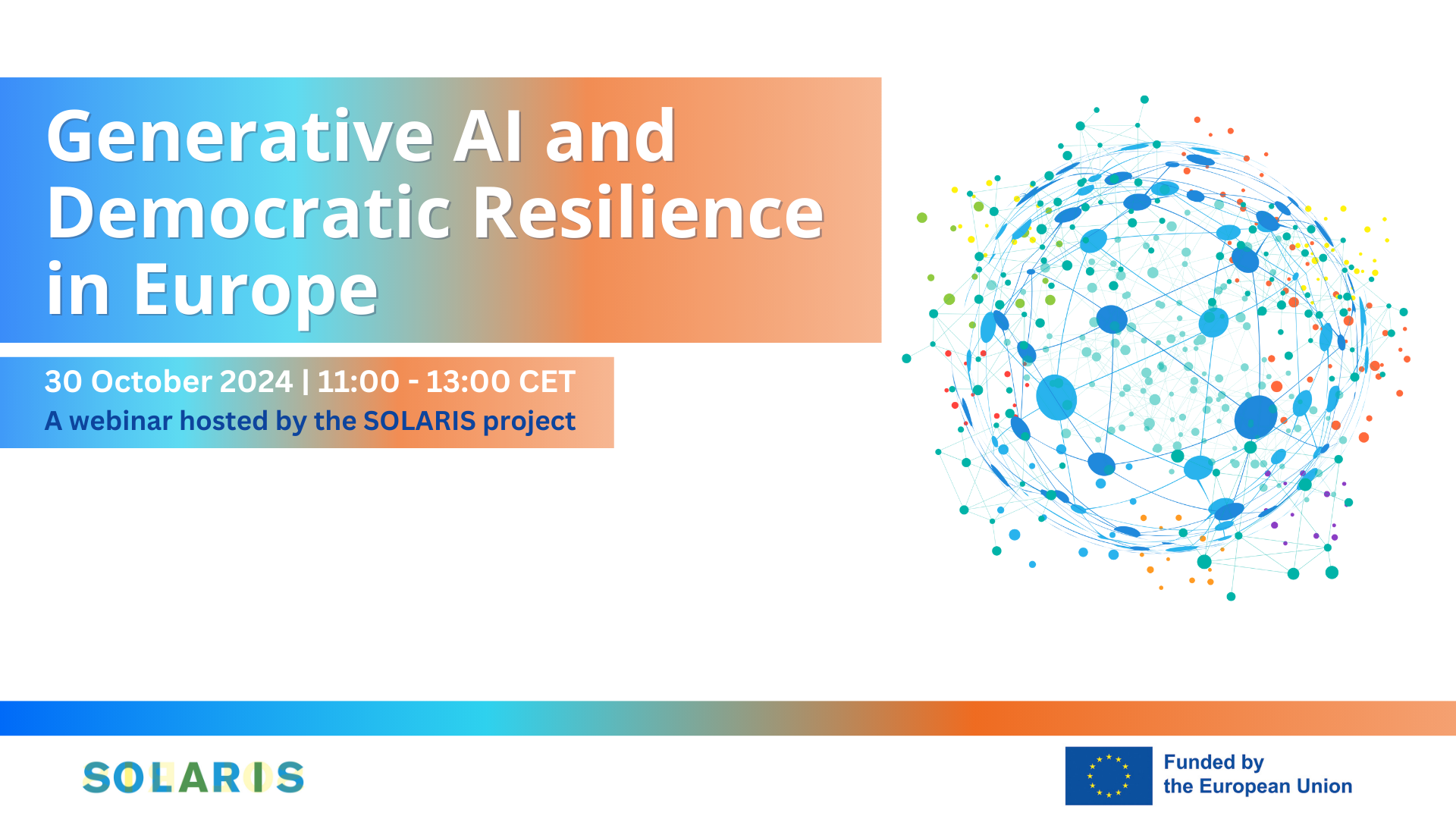Generative AI and Democratic Resilience: Key Takeaways from the SOLARIS Project's Panel Discussion

On October 30, 2024, the SOLARIS Project hosted an insightful online panel discussion addressing the intersection of generative AI and democratic resilience. The event brought together experts from Europe and the U.S. to discuss the impact of AI technologies on democracy, focusing on media manipulation, deepfakes, and the regulatory challenges governments face in protecting democratic systems. The panel offered a comprehensive view of the risks and opportunities posed by AI, highlighting the importance of regulation, media literacy, and public engagement.
AI and Political Communication
Professor Andreas Jünger from the University of Bamberg opened the discussion with a keynote on the risks AI poses to democratic systems. Jünger highlighted the tension between freedom of speech and the regulation of harmful AI-driven content, such as deepfakes. He warned that without agile regulatory frameworks, democracies could become vulnerable to manipulation, stressing the need for both immediate action and long-term solutions like citizenship education. He argued that AI’s influence on political communication could either empower democratic engagement or enhance disinformation strategies, making it crucial to monitor these dynamics.
Journalism in the AI Era
Alessio Iacona, a journalist from Italy’s ANSA news agency, discussed how AI is transforming the media landscape. He noted that AI technologies, particularly deepfakes, complicate the role of journalists, who must now navigate an environment where fabricated content is more prevalent than ever. Iacona emphasized the need for journalists to become "curators of information," verifying facts amid a flood of AI-generated content. He also highlighted the importance of transparency in how newsrooms use AI, advocating for ongoing training to help journalists adapt to these technological shifts.
The European Perspective on AI Regulation
Paola Gürtler, a researcher at the Centre for European Policy Studies (CEPS), provided an optimistic view of the steps Europe has taken to regulate AI. She pointed to the AI Act and the Council of Europe’s AI framework as examples of Europe’s proactive stance. However, Gürtler also expressed concerns about AI’s potential to undermine democratic processes through disinformation. She called for continued vigilance in adapting regulations to new technological realities while ensuring democratic values are upheld.
AI and Digital Authoritarianism
Dr. Marielle Wijermars, an expert on digital authoritarianism from Maastricht University, warned of the global rise of authoritarianism facilitated by AI. She explained that AI tools are increasingly being used by governments to control narratives and suppress dissent. Wijermars urged policymakers to consider AI’s broader social and political implications, arguing that efforts to protect democracy must go beyond regulating AI as a technological issue. She called for a more holistic approach to counter these growing authoritarian trends.
Strengthening Media Literacy and Public Media
Joshua Glick, a visiting associate at Bard College, shifted the focus to solutions rooted in public engagement and education. He argued that digital literacy is crucial for building democratic resilience, especially in the face of AI-driven disinformation. Glick suggested that the U.S. could benefit from reimagining its public media infrastructure, strengthening local institutions such as universities, libraries, and civic organizations to promote media literacy. By educating the public on how to critically engage with AI-generated content, society can better safeguard itself against misinformation.
The Role of Citizenship Education
Maximilian Conrad, professor of European Political Science at the University of Iceland, focused on the importance of citizenship education in the fight against the negative impacts of AI on democracy. Conrad argued that while regulation is crucial, it must be complemented by efforts to educate citizens about digital literacy and the responsible use of AI technologies. His perspective highlighted the need to empower individuals to critically engage with AI-generated content, fostering a more informed and resilient democratic society. Conrad’s insights emphasized that education, alongside regulatory measures, is essential for long-term democratic stability in the age of AI.
Conclusion: Collaboration for Democratic Resilience
The event concluded with a strong consensus on the need for collaboration between policymakers, academics, and civil society to address the complex challenges posed by AI. While the risks to democratic systems are significant, the panelists highlighted various avenues for building resilience, from regulation and education to media reform. As AI technologies continue to evolve, the SOLARIS Project’s initiative to foster informed debate and develop practical solutions will be key to ensuring that democracy can withstand the pressures of the digital age.
Watch the event here:

